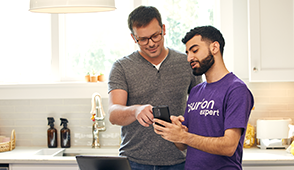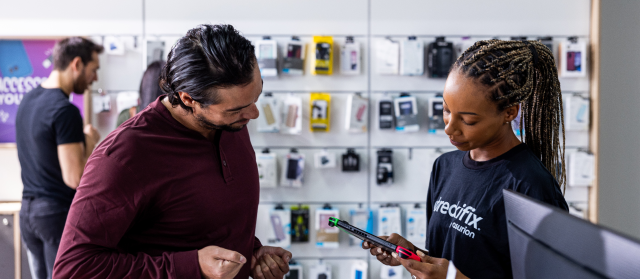In the past, when you wanted to add a doctor's appointment to your calendar, check your flight reservation, or order the best pizza in town, you usually had to do it yourself. Now, AI virtual assistants like Alexa™ or Siri® can perform these tasks for you, quickly and efficiently.
There's a lot of talk about artificial intelligence (AI) these days, and it can be confusing—maybe even a little bit scary. But don't worry, we'll walk you through what it is and what an AI assistant can do for you.
What's an AI virtual assistant?
An AI virtual assistant is a software program that lives in your smart speaker, your smartphone, or other smart device, like a tablet or computer. When it's connected to the internet, your virtual assistant will perform tasks, like setting a timer, or give information, like what was the number 1 song on your birthday, when you ask or tell it to.
Basically, anything you do on your smartphone, you can ask your virtual assistant to do for you.
What can your AI virtual assistant do?
Your voice-controlled virtual assistant can do many cool and surprising things to make your life easier and more fun, including:
- Play trivia or tell jokes.
- Manage your calendar.
- Control your smart home devices.
- Play music or podcasts.
- Order products online.
- Create and send text messages or emails.
- Check the news and weather reports.
- Get directions.
- Call an Uber® or Lyft®.
- Find a hotel or restaurant.
- Search the web.
- Reach out to your emergency contact.

How smart is your home?
Calculate your smart devices, bust common myths, and explore tips from your neighborhood tech experts.
Popular AI virtual assistants
The virtual assistant you'll use depends on the type of smart device or devices you have. Here are some of the most popular AI-powered virtual assistants and their paired brands:
- Siri (Apple®)
- Alexa (Amazon™)
- Google Assistant™ (Google®)
- Cortana® (Microsoft®)
- Bixby® (Samsung®)
Although you can access your virtual assistant through your phone or other smart devices, many people use virtual assistants that come with their smart hubs, like Amazon Echo™ or Google Nest Hub™. Check out our guide to find the best smart home hub for you.
How do AI virtual assistants work?
Let's imagine your day with an AI virtual assistant.
First, you wake up your assistant with a greeting like “Hey Siri" or “Alexa…"
Then you give it your voice command—"Alexa, what's the weather?"—which your assistant hears through the microphone on your device. That command will prompt it to search the internet for an answer, like “There is an 80% chance of thunderstorms today," which you'll hear through the speaker in your smart device, or in some cases, if you prefer and adjust the settings, it can answer you via text.
Next, you can tell your assistant, “Alexa, call me an Uber," and it'll connect you directly to the app to get you a ride.
How does your virtual assistant do all of this? Several advanced technologies, like natural language processing, machine learning, and speech recognition, help it understand what you're asking and to find and clearly communicate the answers to your questions or finish a task.
Even better: Your virtual assistant gets smarter the more you use it—it learns your habits and preferences, gets familiar with your voice, and communicates with your favorite devices and software.
If you're worried about how your virtual assistant will listen to you and when, we get it. Check out this video on whether your assistant is always listening to learn more.
Tech is expensive. Protect it all.
Protect the devices your family loves and relies on with one simple plan. With Asurion Home+®, we cover your computers, TVs, tablets, premium headphones, smart devices, and so much more—plus, 24/7 live support for your tech care needs—for less than $1 per day. Learn more about Asurion Home+® coverage and how you can get peace-of-mind electronics protection.





